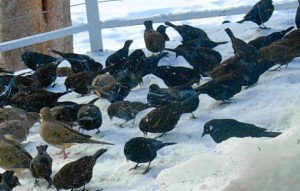South Tahoe blackbirds die from strychnine
By Kathryn Reed
A flock of birds in South Lake Tahoe was thinned out after ingesting strychnine.
Stella McMillin, senior environmental scientist with the state Department of Fish and Wildlife Service, said it is not known if the poisoning was intentional.
El Dorado County Animal Services was called Jan. 28 regarding a large number of dead birds on the ground. Officers found 34 dead Brewer’s Blackbirds in the Tahoe Keys near the intersection of Lassen Drive and Tuolumne Drive.
One bird was alive. Lake Tahoe Wildlife Care was able to rehab it, even though it was in convulsions when it was brought in. It was released Feb. 4.
A flock of more than 150 of these birds was seen in the area in late January. They were feeding in people’s yards.
“Why someone would cast it out in their yard and kill birds is beyond my comprehension,” Cheryl Millham, executive director of LTWC, told Lake Tahoe News. “Don’t let your dog lick anything off the ground. A cat, raccoon, coyote that would eat one of the birds that died of this would have secondary poisoning.”
McMillin said the only legal use for strychnine is to control pocket gophers by putting the poison under ground in their burrows.
“Either someone did an application incorrectly and put it above ground or they intentionally were poisoning blackbirds,” McMillin told Lake Tahoe News.
The state agriculture commissioner will conduct an investigation to try to determine who was responsible for the poisoning. At a minimum, McMillin said her department would come out with advice for people who live in the area about using chemicals that can end up targeting household pets and wildlife who were not the intended victims.
Poisoning animals is a crime.
“At this time, animal services does not know how the birds may have ingested the poison; they did not find any evidence of poisoning in the area where the birds were found,” according to Maggie Williams, spokeswoman for animal services.
Millham said if people have issues with gophers, she has a non-toxic solution she will share. For more info, call (530) 577.2273 or email tom@ltwc.org.
